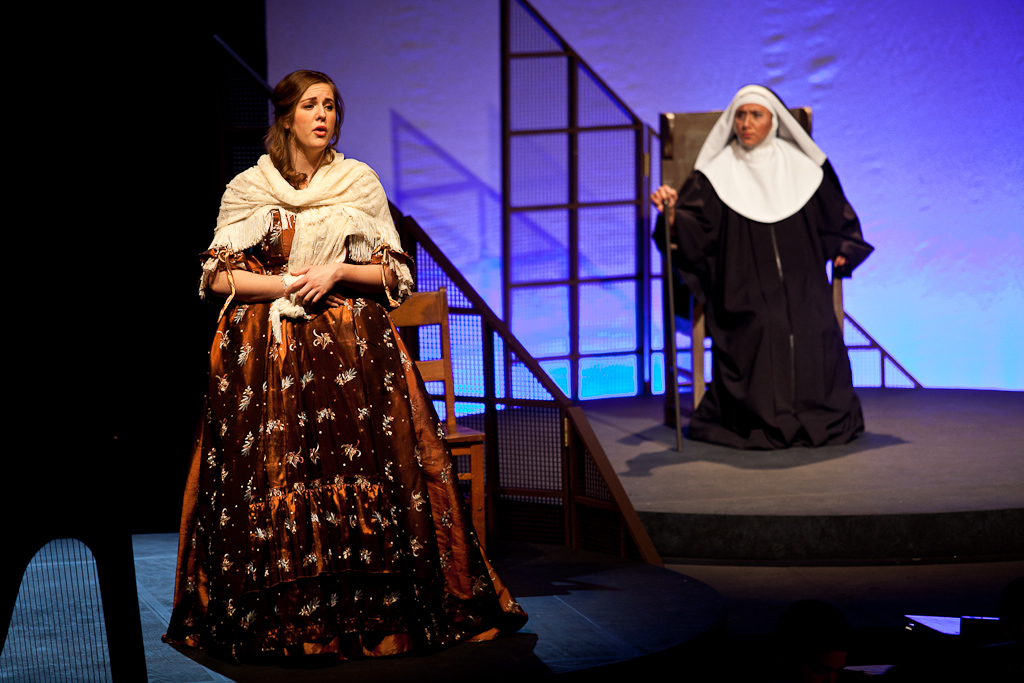
Senior Kristen Tucker plays Blanche De La Force, a girl who decides to commit her life to the convent in the moving opera theatre production of “Dialogues of the Carmelites,” featured by the music department during the second and third weekends in February. | Ashley Jones/THE CHIMES
The story of sixteen nuns condemned for their faith constitutes the material for the “Dialogues of the Carmelites,” an opera showing in Crowell Hall from February 10-12th and 17-19th. Given by Biola’s Conservatory of Music, this production portrays the courage that led these women to the guillotine during the French Revolution.
Donte Apperwhite, a senior and the production manager for the opera, appreciates the thought-provoking nature of the opera. The “real and terrible tragedy” of the Carmelites’ martyrdom compels the question, “What does it mean to go atheistic? What do we lose? What do we gain? We take God out of societies, and we find that they’re inadequate,” Apperwhite said. The “Dialogues of the Carmelites” prompts the audience to consider questions like these in the context of their own faith.
Performance relates to Year of the Arts
Opera is not exactly a typical performance for Biola. However, deciding on “Dialogues of the Carmelites” was an easy decision, says Robison, considering that Sacred Spaces: Sanctuary, is the theme driving the Year of the Arts this year. In the opera, the nuns who live within the refuge of a convent declare their freedom as martyrs for Christ, finding sanctuary in him. Blanche, the main character, seeks safety in the convent. Suffering from severe anxiety and a great fear of the world, the ultimate test of her faith comes when she faces martyrdom.
In order to produce the best show possible, students and faculty have been meeting since August 2011, and staging rehearsals began during interterm. The cast includes 17 nuns, played by students and an alumna, as well as about 15 other supporting characters. An orchestra and a pianist accompany the vocalists.
Actors visit modern Carmelite convent
To further prepare for the show, the students visited a modern Carmelite convent. The Carmelite Order in San Diego, Calif. received the students via “speak rooms” that have partitions in the middle so that visitors can speak to the nuns, who are almost entirely isolated.
Jessica Kremer, an alumna who graduated last May, plays Sister Constance. Visiting the Carmelites enriched Kremer’s passion for the show. Knowing the women gave up everything — opportunities to get married, have children, live in society — for Christ astounds Kremer. Her experience with the show has helped her with spiritual formation.
For many of the other students as well, visiting the Carmelites was a life-changing experience, as they discussed the story of the French Revolution’s Carmelites with the modern-day nuns. Shelby Smith, a sophomore who plays one of the nuns, said visiting made her ponder the significance of Christ-like sacrifice. She saw profound similarities between the devotion of the older and newer Carmelites.
“These women were actually walking up stairs to a machine that would end their life,” Smith said, referring to the Carmelites in the opera. “All they had to do was pretend. But what they believed was more important.”
During the rule of the French Revolution’s atheistic government, the Carmelite nuns were among many who faced the guillotine. Later, during Hitler’s rise to power in Germany, a Catholic writer named Gertrud von Le Fort wrote a novel about the story of the Carmelites. Le Fort found a deep connection between the condition of Hitler’s Germany and the state of France during the revolution.
Opera theme relevant for today’s Christians
The novel, “The Song at the Scaffold,” became a screenplay and then was recreated as an opera by Francis Poulenc, said Jeanne Robison, voice area coordinator and the director of the “Dialogues of the Carmelites” at Biola. To offer context and thought-provoking discussion, the Conservatory will offer five free lectures before some performances.
In the third and final act of the opera, the nuns walk to the guillotine singing. Described by Robison as chilling, yet spellbinding, the cast agrees that this conclusion will have a dramatic impact upon the audience.
“[The nuns] died for Jesus. And we are all believers here, who, hopefully, when we’re put to the test — if we have to — will give our lives for Christ as well,” said Tatyana Catalan, a senior Humanities major who plays a nun.
Robison believes that the opera asks the audience to consider whether Christians should desire martyrdom, and as a result, it contains great relevance to students– especially concerning the struggle of the state and religion at present.
“The most powerful thing is that it actually happened,” Smith says. “The fact that it’s real, that they could turn such an awful death into something beautiful.”







